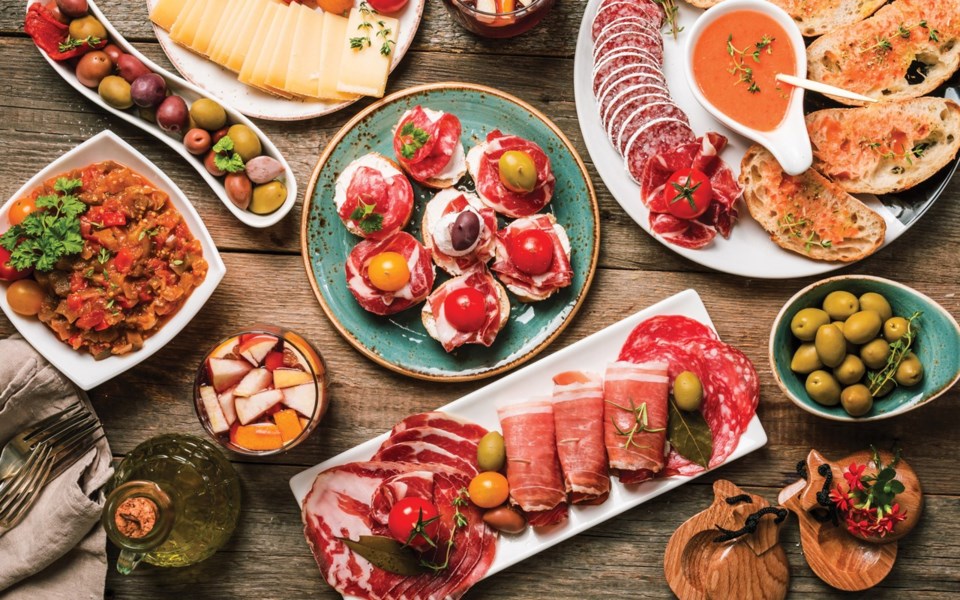Yes, folks, it's a glorious time of year. Feel it! The longer days, the brighter light. The layers of outerwear peeling off, and more and more of our winter-whitened bodies gratefully drinking it all in.
So what have you done for your beautiful bod today? And I don't mean "beautiful" in the usual, weird, idealized sense advertisers and celebrity-soaked tweeters would have us believe.
I don't care if you're pink, green or yellow, withered with age or weakened with disease, strong and stately or short-of-breath and provincial, your body is an amazing, beautiful biological apparatus, something we all need to look after best we can—and that starts with what we put in our mouths.
To that end, here's a quickie cheat sheet on best bets for your fuel intake to kick off this late-bloomin' spring, with thanks to the good folks at the VGH-UBC Hospital Foundation's Healthy Heart Program.
Mediterranean diet is still in
Good news: The science stands firm that what's been dubbed the Mediterranean diet is indeed good for us, specifically our hearts. That includes evidence it's also good for people who already have a history of heart disease.
A landmark clinical trial of 7,500 people in Spain that was led by Dr. Ramon Estruch and first reported in the The New England Journal of Medicine showed that eating a Mediterranean diet supplemented with extra-virgin olive oil or nuts could reduce the risk of cardiovascular disease by up to 30 per cent. It may also help reduce the incidence of stroke for those at high risk. So here's a reminder about what that diet is right from the report's mouth.
The traditional Mediterranean diet is characterized by a high intake of olive oil, fruit, nuts, vegetables and cereals; a moderate intake of fish and poultry; a low intake of dairy products, red meat, processed meats and sweets; and wine in moderation, consumed with meals. And remember, the best results came from study groups where extra-virgin olive oil or nuts were added as supplements to all this.
Too much wine is out
You're probably not going to like this, but note the "wine in moderation" in the above diet. A recent report in The Lancet, based on a meta-aggregation of data from nearly 600,000 drinkers, concludes that, despite earlier studies showing otherwise, drinking alcohol will shorten your life much like smoking cigarettes does. Your best bet: Five standard 175-millimetre glasses of wine or five pints of beer a week. That's it.
O sole mio—it's super sofrito
One of the keys to many dishes in the Mediterranean and throughout Latin America is sofrito, also known as sofritto (with two f's) in Italian and refogado in Portuguese. Even if it doesn't sound familiar, you've probably eaten sofrito more than once. It's a classic, and there are as many recipes for it as there are for spaghetti sauce. But the basics start with tomatoes, garlic, peppers and onions, and add spices from there.
In the first-ever study of the bioactive compounds in sofritos, it was determined they contain all sorts of healthy antioxidants, even ones previously unidentified. Researchers identified 40 different types of polyphenols in sofrito—friendly, helpful polyphenols that are associated with a low incidence of cardiovascular disease. Sofrito also contains other health boosters like vitamin C and carotenoids, organic pigments known for their antioxidant actions, which help protect your beautiful body cells from damage that leads to things like heart disease and diabetes.
Here's a quick recipe for a deilcious sofrito, cold or warm, from one of my favourite cookbooks, 1,000 Vegetarian Recipes:
2 medium green bell peppers, seeded and chunked
1 large onion, chunked
1/2 c. slightly packed cilantro leaves
2 tbsp. cider vinegar
6 cloves garlic
3 jalapeno peppers, seeded and halved
1/4 tsp. dried oregano
1/4 tsp. salt or to taste
Dump it all into a food processor or blender and chop until the veggies are finely processed. If you want cooked sofrito, heat three tablespoons of olive oil over medium-high, add the sofrito and cook about five minutes until the peppers taste cooked.
After dinner, a final tip: Move, folks. Move outside. Move inside. Move often.
Sure, Whistlerites are known for being active. Sometimes. But with the lure of "black mirrors" lurking everywhere—the screens, the pads, the phones—we can all take a tip from the good doctors studying this stuff, like Dr. Larry Frank at UBC, or the British Medical Association.
It's as simple as these food tips. Being active keeps your beautiful bod out of medical trouble. You don't have to jog. You don't have to board or mountain bike. You can just walk.
The US Surgeon General advises that a mere 150 minutes of walking a week will do the trick. That's 22 minutes a day, sort of like the TV show. Or, if you're more of a big numbers or step-by-step person, take 10,000 steps a day. If you're over 55, go for 8,600 steps a day. (People who take only 4,500 steps a day are considered inactive.) At an average stride length of about 1,200 steps per kilometre, your 10 grand steps will be about eight klicks—that's "klick" as slang for "kilometer," which, depending on the source, either came from the military (American or Aussie) or the sound odometers once made as they clicked off a mile or kilometre.
Click off those steps now. Good luck.
Glenda Bartosh is an award-winning journalist who loves Olive Oyl.




